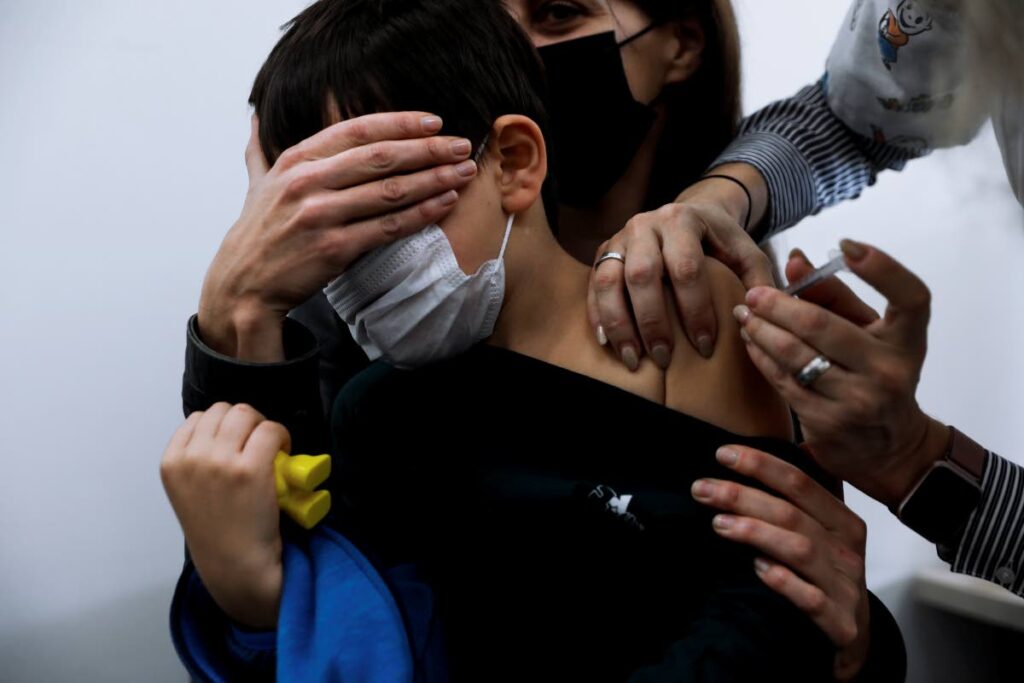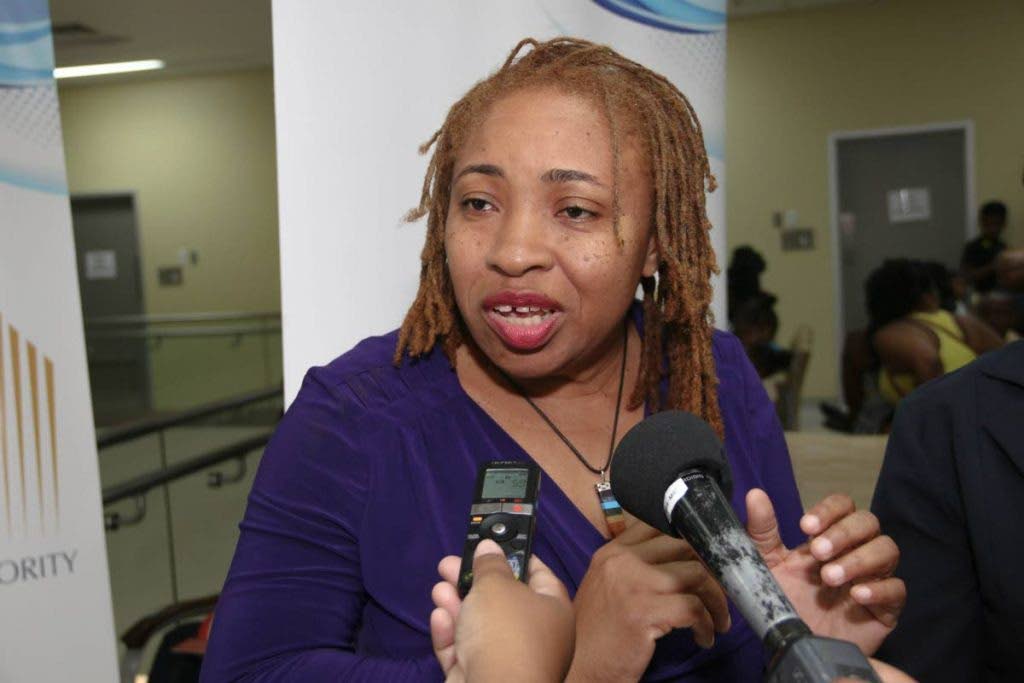Experts appeal as covid19 cases rise: Vaccinate to save a child's life

Over the past three months 14 children under the age of one have been admitted to hospital with covid19 with 11 of them being under three months old, Health Minister Terrence Deyalsingh said on November 24
He also announced that four children, under the age of 18, have died since the pandemic began in March 2020.
The information disclosed did not include the number of cases among children between ages one to 17.
Many children in TT may have been seriously ill owing to covid19, and later multisystem inflammatory syndrome in children (MIS-C), which can occur around six weeks after a child is infected with even a mild or asymptomatic case of the virus.
Now, with the delta variant prominent in the population, doctors are saying even more, and serious, paediatric cases of covid19 can be expected.
Speaking to Sunday Newsday, Dr Peter Chin Hong, infectious disease specialist at the University of California, San Francisco, explained: “Before delta (covid19 variant), kids were spared because they have fewer receptors for ACE2 so the virus has less room to go into the kids’ bodies. But during delta, what we have seen in the US is more than a 200 per cent increase in cases. A lot of kids ended up going to the hospital and the ICU (intensive care unit), particularly in some states where there is a lot of transmission.”
ACE2 is a receptor on certain cells that the virus uses to get into the body and replicate.
Since the delta variant generates more virus particles, many people, even those who are protected, will be infected. Also, over time, children become the more vulnerable because they are unvaccinated.
“In TT, under 12s are not vaccinated yet so they have ended up becoming more at risk because they are the ones left who have not had protection. Then, particularly with babies, there’s a study showing that they become infected because adults have to take care of the babies, and everyone dotes over the babies. So even though adolescents or young adults bring the virus into the household, in the era of delta, the babies are the ones who get it and then spread it to other people in the family.”
He said the way to protect babies is by protecting those who interact with them. So, parents, grandparents, siblings and those in the household should get vaccinated to protect those who cannot get the vaccine.
A September 3 report from the US Centers for Disease Control and Prevention said, “During March 1, 2020-August 14, 2021, the cumulative incidence of covid19-associated hospitalisations was 49.7 per 100,000 children and adolescents. The weekly covid19-associated hospitalisation rate per 100,000 children and adolescents during the week ending August 14, 2021 was nearly five times the rate during the week ending June 26, 2021; among children aged zero-four years, the weekly hospitalisation rate during the week ending August 14, 2021, was nearly ten times that during the week ending June 26, 2021. During June 20-July 31, 2021, the hospitalisation rate among unvaccinated adolescents (aged 12–17 years) was 10.1 times higher than that among fully vaccinated adolescents.”
Chin Hong added that in the UK the rate of hospitalisation in children was about half of that of the US. It is believed to be the case because the UK has less cases of childhood obesity, diabetes, and congenital heart disease than the US.
He said those were the children who were being hospitalised and dying of the disease, in addition to those with epilepsy and other seizure disorders.

“It’s tough to diagnose covid in kids in general and it’s even tougher on a baby because it just seems like they have gripe or have a cold or something.
“And if you have one of these kids (with underlying conditions) and they end up getting covid, you want to pay special attention to them because they can deteriorate. This is as opposed to most kids where nothing happens. The US data shows that two to four per cent of children get hospitalised and they usually had an underlying condition.”
Symptoms in children are similar to adults but with more gastrointestinal issues.
He said 60 per cent of children would get cough, fever, shortness of breath; ten per cent may get muscle aches; ten per cent may get nausea, vomiting and abdominal pain, which is not very common in adults; 15 per cent would get diarrhoea, and one per cent may get loss of taste and smell.
He added that not much is known about the effect of covid19 in the under-one age group. The hospitalisation of children is still relatively low but in the past year the virus has been one of the top ten causes of deaths in children, ages five to 11, in the US.
Dr Joanne Paul, head of the Paediatric Emergency Department, Eric Williams Medical Sciences Complex, said TT has had less paediatric covid19 deaths than the global ratio but more cases of MIS-C than other islands in the Caribbean, although there were no deaths from MIS-C.
“We think it’s the influence if the ethnic mixture. It’s been shown that children with black and Latin heritage are more prone to developing MIS-C, so we’ve had more of those because we’re the most mixed population in the Caribbean.
“My main thrust is, it doesn’t really matter to me if we’ve been doing better or worse. What matters is that we’ve had deaths. Even though we knew it was an impossible goal, our goal was always to have no paediatric deaths. We haven’t been able to achieve that because delta is so transmissible as well as our lower vaccination rate.”
She said most of the current cases in adults and children are from delta. The other strains are not as transmissible, and children are usually asymptomatic in those cases, so they were not as affected.
Paul added that earlier in the year, with non-delta strains, the main factor in hospitalisation and death was comorbidities. With delta, the major factor is the unvaccinated because the variant generates so many virus particles, it requires higher immunity.
“I’m not a person who spouts a narrative. I’m a person who thinks, looks at data, and gives the required recommendation and the fact is that delta is much more severe for the unvaccinated and it’s going towards the younger population. And that’s why you’re seeing more deaths in children right now.”
How to save a child from dying
She said no one wants to see a child die. Even after years of working in paediatric emergency medicine it still breaks her heart.
“Then you have to deal with the staff who are affected, the parents, the grandparents, the family members. The loss of that trajectory of that potential life… you have to go home and recover from it.”
Since those under 12 cannot yet be vaccinated, she urged people to get vaccinated to prevent another child from dying. Vaccination reduces the amount of viral particles transmitted so children and babies would not contract covid19 or would get a mild case and so are less likely to die.
Although pushed to second place, comorbidities are still a factor in hospitalisation and death. She observed that those more at risk had obesity, diabetes, hypertension, as well as renal and cardiac issues.
Paul added that children usually have multiple symptoms as their organs become inflamed.

“In adults, the receptors for the virus are more to the lungs so they would present with more respiratory issues, while in children, the receptors for the virus are in the brain, in the heart, in the gut, and also in the lungs. Therefore, they present from those organs.”
With an inflamed brain children can become lethargic, “out of it” and begin talking nonsense. Inflammation of the gut can cause diarrhoea, coughing and trouble breathing with the lungs, and a fast or irregular heartbeat.
They usually get symptoms from each affected organ at the same time.
“Although children generally have milder symptoms or are asymptomatic, with delta, children and young people are much more at risk and that is the game changer.
“With delta they can go from having a little thing (mild symptoms) and then suddenly, in the next few hours, boom, they are much worse. If you find that happens, don’t be, ‘Let me watch it for a while.’ Just know that delta has a fast deterioration. So if two or more symptoms are involved and they deteriorate fast, you need to have your child checked.”
She said covid19 symptoms in children are similar to MIS-C except, in addition to the organs, the blood vessels are also inflamed.
She added that a child cannot have MIS-C and covid19 at the same time, but could still test positive because, although there would be no live viral particles, particles could linger in the body for months after without being infectious.
In order to care for children with covid19, Paul suggested caregivers ensure they are well hydrated. They should be given paracetamol or ibuprofen for fever, saline nose drops every two hours for nasal congestion, Gesol and Paedialyte or watered down coconut water or watered down Gatorade to replace fluid loss with diarrhoea, with small but frequent amounts of food. Also reduce their screen time to not irritate the brain and give them comfort and loving care.
For babies she suggested paracetamol and breast milk. She advised parents to feed the baby with each diarrhoea episode to replace the fluids lost. Breastfeeding mothers should get vaccinated to give the antibodies to babies via breast milk and keep themselves well hydrated to be able to give optimum breast milk.
“The main thing though is to monitor. Take care of them and monitor for deterioration and have someone who is a medical professional doing a virtual checks daily.”
How death of a child affects families
Psychologist Dr Margaret Nakhid-Chatoor noted that during the pandemic children were mostly behind closed doors compared to adults. But now that secondary schools and activities are reopening and children are more exposed to infection, the country is seeing an increase of the number of covid19 cases in children.
“A nurse told me, even before all of this, there were children coming into the hospitals with covid but it was not announced, but now children are dying.”

“I think parents have to be sensitised. We have focused so much on adults getting the virus that we have hardly focussed on children. We need to let parents know they have to consult a doctor or go to the hospital if their child has a sore throat, coughing, is wheezing instead of expecting the child to get over it.”
She said the death of a child is a traumatic and usually unexpected event that has long term effects on the lives of parents and close family members. For parents especially, the pain persists for months, even years, with many of them just existing.
“The death of a child defies the expected order of life. Many parents have begun to question life, their belief in God, their purpose. They are confused, unable to cope.
“Secondly, there is complicated grief in many cases where parents just cannot understand. This comes from the guilt and failure they experience from not being able to care for, protect and save their child.”
That feeling of guilt becomes more complicated if a parent or sibling carries the virus into the home. Some can not face family and friends and isolate themselves.
“When a child dies there is a lot of blame going on – who gave the child the virus or the child should have been taken to the hospital sooner. Because how would babies get the virus if not through their parents, especially parents who have not been vaccinated? So this grieving can turn into a lot of blaming and guilt which can affect the relationships of the parents because of the anger.”
She added that children, especially younger ones, can find it hard to cope with the loss of a sibling, especially if no one talks about it.
Also, if the child is a member of a school community, it is not only upsetting to the family but as many as 137 staff members and classmates, the family of classmates, and all those who knew the child.
Nakhid-Chatoor said mothers especially have a hard time coping which could affect their health behaviours including changing their eating habits, not taking care of themselves, and turning to substance use to cope.
She said it is important for parents to talk about the loss and for others to provide comfort and support, and help them find meaning in their lives especially now that wakes or large funerals are discouraged. If this or professional support does not take place, it could prolong grief.
“I think much more public awareness has to be on how to protect our family, especially where children are concerned. I think we have focussed too much on the elderly and adults. As much as possible we need to provide guidelines on how to keep our children safe when they are ill, before they die.”
When children are ill, she advised caretakers keep them away from others as much as possible, open windows or let them outside for fresh air, be mindful of the health protocols – wear masks, wash hands, show them how to cough into the crook of their elbows – and consider wearing gloves when changing diapers.


Comments
"Experts appeal as covid19 cases rise: Vaccinate to save a child’s life"